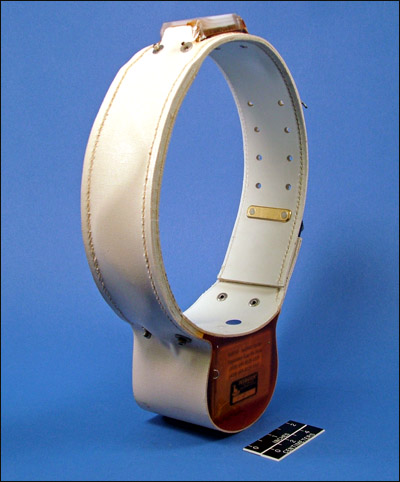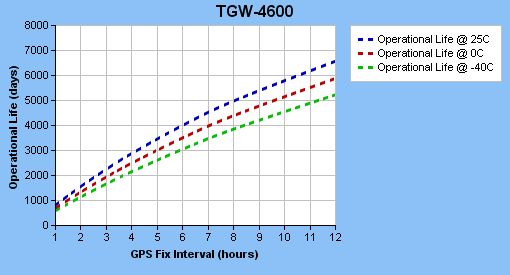TGW-4600 GEN 4 GPS Subsystems
The information below on discontinued products is provided for individuals who are still using these older systems. Product descriptions may be time sensitive or even outdated. Please contact Telonics if you have questions.

TGW-4600 GPS transmitter shown on 1/16" butyl over 1/8" butyl collar with a CAST-4 option
| Dimensions L x W x H (in, cm) |
Canister Weight (g) |
Estimated Weight with Collar (g) |
1 YR Operational Life |
2 YR Operational Life |
3.25 x 2.75 x 2.25
8.3 x 7.0 x 5.7 |
625 |
1100-1200 |
30 minute fix interval |
1 hr 15 minute fix interval |
The TGW-4600 is a fourth generation store on board GPS subsystem which includes a GPS receiver, uGPSi controller/data logger and a VHF transmitter beacon. The unit was designed to be mounted on a collar for attachment to medium to large size terrestrial mammals. The system acquires GPS positions on a user determined schedule and stores the GPS positions in the nonvolatile onboard memory for download after the unit is recovered. Store on board systems are less expensive because there is not a wireless data transfer capability for the GPS data. Store on board systems should be deployed in applications where real time GPS positional data are not required to meet the goals of the study design. In addition to GPS positional data, the unit is capable of collecting temperature and activity data on schedules independent of the GPS data collection schedule. These data are also stored in memory. All schedules for data collection and the operation of the beacon are user programmable either at the time of order or through a user friendly programming interface called Telonics Product Programmer, TPP (purchased separately). Data are downloaded using a data downloading utility called Telonics Data Converter, TDC (purchased separately). To use either of these utilities a TSC-3 cable and adapter is used to connect the user's PC to the unit. The VHF beacon operates on an independent battery and can be used to track the animal during the operational life of the subsystem. The VHF transmitter reports on the performance of the GPS portion of the unit during the period of deployment and a mortality sensor can be used to determine if the animal is alive or dead. The VHF transmitter is also used to locate the unit for recovery.
Key Features
- Lower current consumption provides a 100% increase in operational life or an increase in performance during that same operational time frame.
- The newest GPS receiver technology provides faster time to fix.
- More flexible programming schedules available to the user.
- Single printed wiring board construction and higher integration makes the electronics more rugged and increases reliability in high shock/vibration environments.
- uGPSi 20 is supported by GUI programming interface (TPP) making it possible for user to program their own systems and simulate the performance of the system prior to deployment.
- The Telonics Data converter (TDC) provides complete data decoding of Argos DS files and supports complete memory downloading. TDC provides a standard .csv output file (comma separated value) with time stamps for all data collected. TDC can be run in the "batch mode" for hands off operation.
Operational Life Information
Specifications: Electronic and Packaging
General System Specifications
| Timing Accuracy | Timing is synchronized to GPS time when available. If the GPS time is not then internal timing accuracy is:
6 min/year at 25° C
30 min/yr -20 to +40° C
47 min/yr -40 to +70° C |
|---|
| Available Sensors | Mortality, Activity, Temperature, Low Voltage |
|---|
| Memory Capacity | Capable of storing 100K fixes in nonvolatile flash memory in association with other sensor data |
|---|
GPS Receiver Specifications
| Standby Current | 0µA |
|---|
| Performance | 12 channels
-156 dBm tracking sensitivity
-142 dBm acquisition sensitivity |
|---|
| Datum | WGS-84 |
|---|
| Time to First Fix (TTFF) | 40sec typical (with clear view of sky) |
|---|
µGPSI-020 VHF Transmitter Specifications
| Available Frequency Options | Option 705 140-154 MHz;
Option 707 144-158 MHz;
Option 715 154-171 MHz;
Option 720 160-177 MHz;
Option 740 174-192 MHz;
Option 750 191-210 MHz;
Option 760 210-237 MHz
The MK10 frequency can be programmed in 100Hz steps within a given frequency range. |
|---|
| Frequency Stability | Better than ±3ppm at room temperature;
±5 ppm total tolerance over full temperature range |
|---|
| Operating Temperature | -40° to +70°C (end user must ensure that the power supply/battery can provide the required peak current and voltage) |
|---|
| Pulse Width | Programmable (10 to 250 msec) |
|---|
| Pulse Period | Programmable (560 to 5000 msec)
3 separate pulse period values selectable:
Period 1 (indicates last GPS fix successful)
Period 2 (indicates last GPS fix unsuccessful)
Mortality period (if no motion for selected time) |
|---|
| Available Sensors | Mortality Sensor (parameters are user programmable) |
|---|
| Transmitter Timing | Programmable seasons and duty cycles |
|---|
| Power Output | Programmable Low/Medium/High power. Effective Isotropic Radiated Power (EIRP) varies, depending on packaging, antenna configuration, and immediate environmental conditions.
* California Users: This transmitter meets the California requirement of EIRP < 0.0009W for all configurations. |
|---|
| Emission Designator | 2k00P0N |
|---|
| Harmonic Suppression | Better than 30dB (>40 dB typical) |
|---|
| Spurious Emissions | <-35 dBc at 10kHz offset from carrier |
|---|
| Frequency | Aging: <2ppm/yr
Shock: <1ppm 3000g x 0.3ms x ½ sine x 3 dir |
|---|
| VSWR | RF output stable to 10:1 VSWR, all phases
Radiated harmonic levels are degraded with poor load VSWR
Spurious emission specification maintained for >10:1 VSWR |
|---|
| Programming | Transmitter parameters programmable via antenna "1-pin" interface and Telonics TPP PC software |
|---|
Packaging/Housing Specifications
| Hermetic Metal Canisters | Electronics are sealed in hermetic metal canisters containing the electronics, batteries, and all interconnects. Glass to metal feed-thru technology is used to exit antennas and power. This packing is hermetic and can be tested utilizing a helium leak bomb test for hermeticity to assure < 1 part in 106 atmospheric CC per second. |
|---|
GPS Antenna Specifications
| Collared Mounted GPS Antenna | In collar mounted wildlife configurations, the GPS antenna is designed to be mounted on the dorsal surface of the neck. The GPS antenna is installed in a high impact nonconductive plastic housing. The form of the housing presents sloping sides so that it will be impervious to chewing and gnawing as is possible. A highly armored antenna cable connects the GPS antenna to the instrument package. |
|---|
Collar Specifications
| Collared Designs | Collar designs are species specific. |
|---|
Service Commitment
Since 1970, Telonics has built a reputation based on product quality, product support, service, and customer satisfaction. Telonics strives to produce the highest quality products, and to support those products accordingly.
Because of extreme conditions and the unpredictable nature associated with most telemetry applications, problems occasionally arise. Most problems can be resolved quickly. In all cases, we hope to be able to work in partnership with users to resolve problems to the user's satisfaction and to uphold our demonstrated commitment to excellence. If problems should arise, all products must be returned to our factory for failure analysis.
Warranty: GEN 4 GPS Systems - Show
Telonics warrants its GPS products to be free from defects in material and workmanship for a period of one year from the date acquired. Telonics does not warrant batteries.
Telonics designs and manufactures systems for a variety of applications using several satellite systems (GPS, Argos, Iridium, and Globalstar). At the time of manufacturing, Telonics equipment is tested to verify compatibility with the applicable satellite system(s). Telonics does not warranty equipment against changes in satellite system specifications or satellite operation after the date your equipment was manufactured. Unforeseeable or unplanned system changes would include, but are not limited to, elevated ambient noise levels in the radio frequency bands used for satellite communications, elimination of service in a region of the world, data outages due to technical problems within the satellite system network, or reductions in data transfer capability due to alterations in the constellation as a result of premature space vehicle failures or failure to replace space vehicles in a timely manner.
If a defect occurs, return the equipment to us within the proper time frame at the following address: TELONICS, 932 E. IMPALA AVENUE, MESA AZ USA 85204-6699. The customer shall arrange for and pay all shipping, insurance and related charges incurred in the shipment to and from Telonics under this warranty. Damage to any equipment resulting from misuse, accidents, unauthorized service, extreme conditions, or other causes, is excluded from this warranty. Telonics does not assume responsibility for loss or damage to equipment during shipment. Telonics does not assume responsibility for delays resulting from shipment on commercial or private carriers. We insure all equipment shipped from our facility and suggest that shipments to Telonics also be insured.
Upon the timely return to our facility, if defective, the product will be replaced or repaired at our discretion at no cost to the customer. This remedy is the exclusive remedy. This product is supplied without any further warranties or conditions, expressed or implied, including warranties of merchantability, quality or fitness for particular reason or those arising by laws, statutes or trade usage or course of dealing.
The entire risk, as to the results and performance of the product, is assumed by the customer. Neither Telonics, nor its suppliers, shall have any liability to the customer or any other person or entity for any indirect, incidental, special, or consequential damage whatsoever, regardless whether Telonics has been told of the possibility of such damages or that such damages might be foreseeable. Telonics has no responsibility or liability for the claims of any third party. The maximum aggregate to the customer, of Telonics and its suppliers, shall not exceed the amount paid by the customer for the product.


